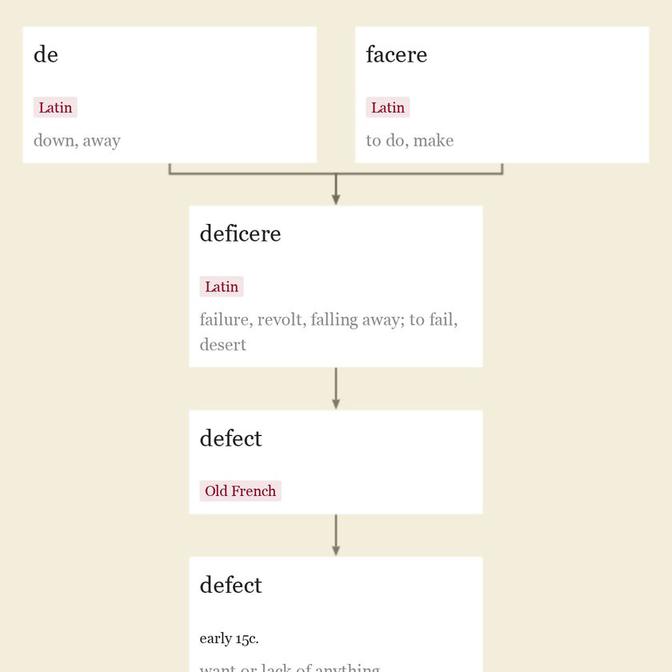defector (n.)
"叛逃者或背叛者",1660年代,拉丁形式的代理名词,来自 defect,或者来自拉丁语 defector "叛乱者",代理名词来自 deficere "背叛,叛乱,失败",来自 de "向下,远离"(见 de-) + facere "做,制造"的组合形式(来自 PIE 根 *dhe- "设置,放置")。特别是指在1953年之前逃离苏联统治国家前往西方的重要人物。
defector 的相关词汇
在英语中,活跃的构词成分,许多动词源自法语和拉丁语,来自拉丁语 de"向下,从下,从,离开; 关于"(见 de),在拉丁语中也用作前缀,通常表示 "向下,离开,远离,从中间,从下面",但也表示 "到底部,完全",因此在许多英语单词中表示 "完全"(强调或完成),作为其意义。
作为拉丁语前缀,它还具有撤销或反转动词动作的功能,因此它被用作纯否定词 - "不,相反,撤销" - 这是它作为英语中活跃前缀的主要功能,例如 defrost(1895), defuse(1943), de-escalate(1964)等。在某些情况下,它是 dis- 的缩写形式。

15世纪初,“缺乏或缺少任何东西”,尤其是缺少完美或完整所必需的东西,源自古法语 defect,直接源自拉丁语 defectus “失败,叛乱,背叛”,是 deficere “失败,离开”的过去分词名词用法,由 de “向下,离开”(见 de-)和 facere “做,制造”的组合形成(来自 PIE 根 *dhe- “设置,放置”)。
*dhē-,原始印欧词根,意为“设定,放置”。
它构成以下词汇的全部或部分: abdomen; abscond; affair; affect(第一动词)“在心中留下印象”; affect(第二动词)“假装”; affection; amplify; anathema; antithesis; apothecary; artifact; artifice; beatific; benefice; beneficence; beneficial; benefit; bibliothec; bodega; boutique; certify; chafe; chauffeur; comfit; condiment; confection; confetti; counterfeit; deed; deem; deface; defeasance; defeat; defect; deficient; difficulty; dignify; discomfit; do(动词); doom; -dom; duma; edifice; edify; efface; effect; efficacious; efficient; epithet; facade; face; facet; facial; -facient; facile; facilitate; facsimile; fact; faction(名词1)“政党”; -faction; factitious; factitive; factor; factory; factotum; faculty; fashion; feasible; feat; feature; feckless; fetish; -fic; fordo; forfeit; -fy; gratify; hacienda; hypothecate; hypothesis; incondite; indeed; infect; justify; malefactor; malfeasance; manufacture; metathesis; misfeasance; modify; mollify; multifarious; notify; nullify; office; officinal; omnifarious; orifice; parenthesis; perfect; petrify; pluperfect; pontifex; prefect; prima facie; proficient; profit; prosthesis; prothesis; purdah; putrefy; qualify; rarefy; recondite; rectify; refectory; sacrifice; salmagundi; samadhi; satisfy; sconce; suffice; sufficient; surface; surfeit; synthesis; tay; ticking(名词); theco-; thematic; theme; thesis; verify。
它是以下词汇的假定来源/其存在的证据为:梵语 dadhati “放置,安排”; 阿维斯塔语 dadaiti “他放置”; 古波斯语 ada “他制造”; 赫梯语 dai- “放置”; 希腊语 tithenai “放置,设置,安置”; 拉丁语 facere “做,干; 执行; 带来”; 立陶宛语 dėti “放置”; 波兰语 dziać się “正在发生”; 俄语 delat' “做”; 古高地德语 tuon,德语 tun,古英语 don “做”。